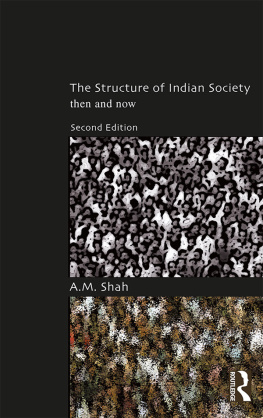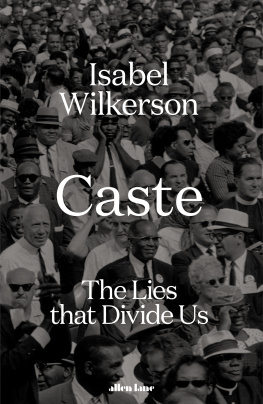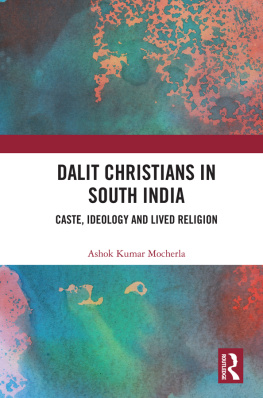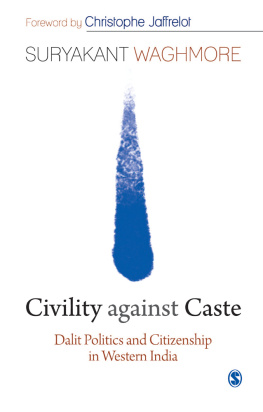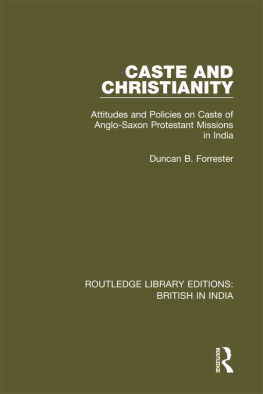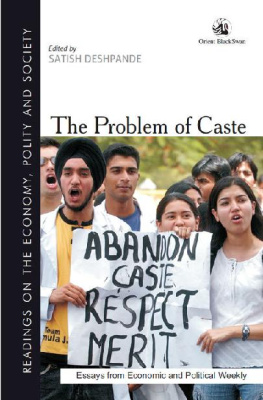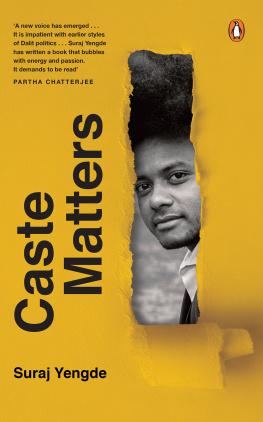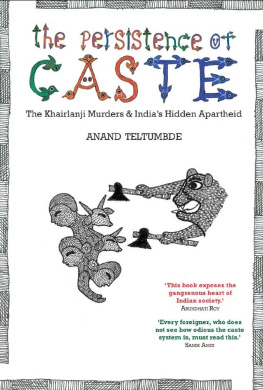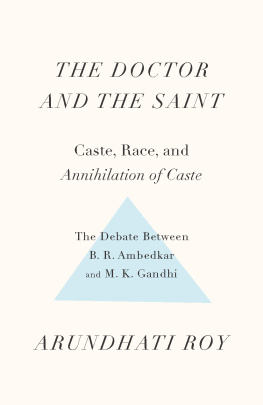PRACTICINGCASTE
COMMONALITIES
Timothy C. Campbell, series editor
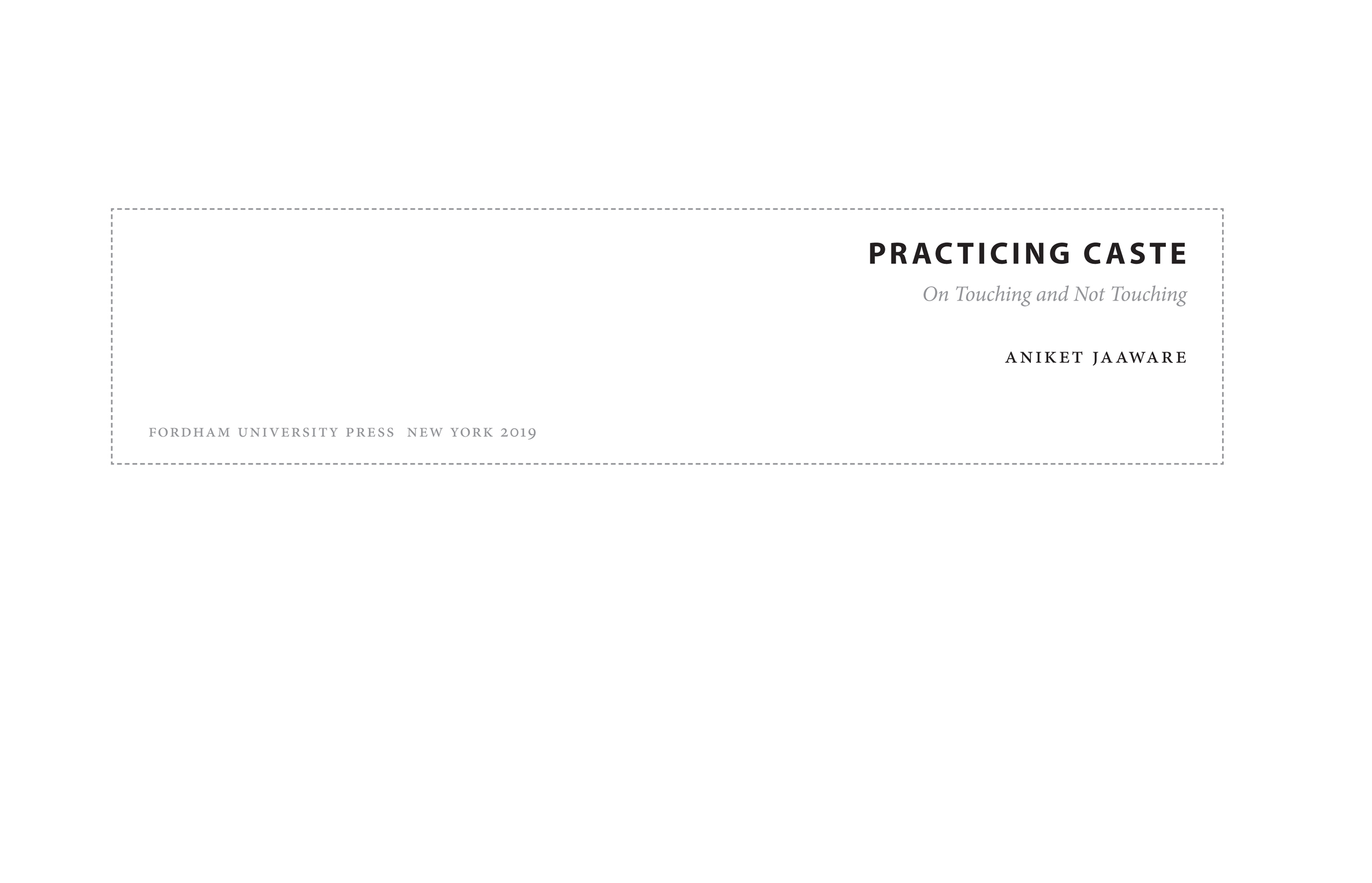
Copyright 2019 Fordham University Press
All rights reserved. No part of this publication may be reproduced, stored in a retrieval system, or transmitted in any form or by any meanselectronic, mechanical, photocopy, recording, or any otherexcept for brief quotations in printed reviews, without the prior permission of the publisher.
Fordham University Press has no responsibility for the persistence or accuracy of URLs for external or third-party Internet websites referred to in this publication and does not guarantee that any content on such websites is, or will remain, accurate or appropriate.
Fordham University Press also publishes its books in a variety of electronic formats. Some content that appears in print may not be available in electronic books.
Visit us online at www.fordhampress.com.
Library of Congress Cataloging-in-Publication Data available online at https://catalog.loc.gov.
Printed in the United States of America
21 20 19 5 4 3 2 1
First edition
CONTENTS
Such a promiscuous word caste is. It is used in so many ways and brings so many references, and it delivers, after some yielding and coaxing, so many meanings. It does not remain faithful/pure/chaste to itself ever; it is clear that no caste is celibate.
So begins the last chapter of Practicing Caste: On Touching and Not Touching . The book is a remarkable exercise in showing what is possible when we attend to caste as if we were confronting it for the first time, bracketing the extensive scholarship about it, and refusing to adopt a ready political stance against caste discrimination and inequality. Practicing Caste asks what new ways of thinking about caste are enabled when we approach caste ignorantly, that is, when we forget the weight of its millennial history and turn to caste less as an exception than an occasion to rethink the grounds of sociability.
The social, sociality, and sociability are very much at issue in this work, which is marked by acute ethical purpose. However, Aniket Jaaware begins by setting aside questions of ethics and politics. Instead, he invites us to undertake an experiment: Make caste less abstract and less Indian by letting go of the standard paradigmsliterary, sociological, philosophical, Indologicalthat have allowed caste to function as an analytic shorthand for understanding a social order, a set of practices, and a way of thinking. To defamiliarize caste and mark it as one form of social distinction among others brings caste within the fold of (global) philosophical inquiry as one iteration of the more general problem of the human. Practicing Caste also challenges those who argue from the perspective of castes apparent facticity to ground their analysis in first principles.
Oublierring ( oublier + err ) is the term Jaaware has coined to describe this act of forgetting and thinking anew. He urges us not to restrict our understanding of caste to the performance of hierarchy as anthropologists do, engage with it as a form of stratification and inequality as sociologists insist, or to approach caste as a form of community and identity as many historians argue. Instead, caste is removed from the domain of subcontinental specificity and associated with the simple divide between touching and not touching, of bringing near or keeping something or someone at a distance. The text brilliantly argues that the peculiar (and peculiarly contingent) manner by which caste became Indian, and the subcontinent imagined as a place governed by the enduring consequences of ritualized forms of inclusion and exclusion, can be traced back to the simple distinction between touching and not touching, rather than any originary ban, taboo, or proscription. Caste is concrete; it is generated by touch: touching yourself, fondling a baby, the chair touching your buttocks, killing someone. Touch is everywhere, and touch is happening all the time whether willingly or unwillingly. The ubiquity of touch allows it to withdraw from consciousness, even as it grounds perception.
How are forms of agonistic intimacy generated by the archaic and somewhat anarchic facticity of touch? How do they take form and shape as that (impossible) intimacy we apprehend as caste?
Perhaps we can best appreciate the question, and the distinctive nature of Jaawares response to it, by bringing Practicing Caste into conversation with the work of the radical anticaste thinker B. R. Ambedkar (18911956), who struggled his entire life to comprehend the astonishing longevity of a social order governed by proscriptions on touch, which was manifest in the absolute divide between those categorized as Touchable and Untouchable. Practicing Caste questions the relationships among caste, touch, and untouchability, but it does so by avoiding sociologism and leaving open-ended the question of how identity relates to experience.
Ambedkars effort to understand the system of caste focused on the social regulation of sexual touch, which translates into a proscription on marriage across castes. (In kinship studies, this is the concept of caste endogamy.) Ambedkar asks: If caste is predicated on the preordained legibility that marks the child by the caste of his or her father, then what is the relationship between sex and the social? In an early essay, written for a Columbia University seminar when he was twenty-five years old, Ambedkar addressed the relationship between social status and sexed scarcity by focusing on the elimination of high-caste surplus women through incitement to sati (widow immolation). In that essay, Castes in India , Ambedkar underscores the artificial nature of scarcity, which is produced by ridding society of widows, surplus women, through resort to ritual injunction for good wifehood. Since the institution of marriage also institutes caste, anxieties about birth, descent, genealogysexual intimacy, in briefwill forever stand behind the question, What is your caste?
Jaaware does not follow Ambedkar in his desire for origins, even though Ambedkar and his predecessor, the radical satyashodak (truth seeker) Jotirao Phule, are recurring presences throughout the book. Institutions require the fiction of origins. So, too, do constitutions. As chairman of the Constitutional Drafting Committee, Ambedkar is modern Indias reluctant founding father. In his writings and speeches, Ambedkar draws our attention to the gap between legislated redress and existential suffering, and between the founding document and the equality it imagines. The recurrent staging of these aporias also allows Ambedkar to underscore the impossible yet necessary task of annihilating caste. Instead, Jaaware scales up from the body to literal and metaphorical layers of touch. He calls Practicing Caste a tropology and invites us to view caste (as system, structure, grid, or field) as a potent, powerfully precise virtualization of touch. Much rides on the singularity of touch. Touch is both ubiquitous and necessary. Touch, skin, and body function as a threshold between inside and outside, and together they illuminate the generative power of the haptic. Touch has the ability to mediate between empiricism and abstraction, and between the literal, the metaphorical, and the metaphysical.
What I have called the virtualization of touch is tracked here with deceptive simplicity. This is philosophical thinking at its bestconcrete, everyday, and open to new ways of thinking about old words and worlds. In a powerful discussion of capitalism and religion, Jaaware maps the difference between caste and class onto the distinction between societies of inheritance and acquisition, respectively. In turn this is predicated on how each understands the relationship of intellectual and manual labor, and therefore the business of abstraction . However the texts tour de force lies in Jaawares attention to rhetorical categories (literal, figural) for classifying touch along the axis of good and bad valuations, which is scaled up to consider literary questions of style, and genre.
Next page

